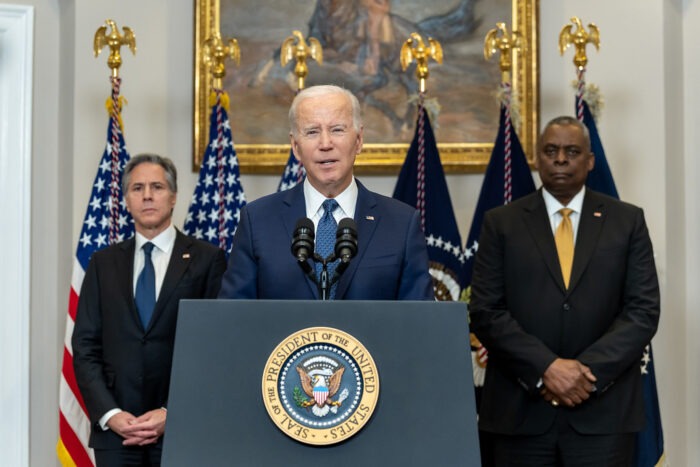According to a new report, White House staffers have had to tread carefully when briefing President Biden on certain topics in order to avoid provoking his anger, displaying a concerning dynamic within the administration.
“It’s like, ‘You can’t include that, that will set him off,’ or ‘Put that in, he likes that,’”a senior administration official told Politico, referring to how some of the 81-year-old president’s aides feel they have to walk through a minefield before briefings to avoid him getting angry with them. “It’s a Rorschach test, not a briefing,” the source added. “Because he is not a pleasant person to be around when he’s being briefed. It’s very difficult, and people are scared s—less of him.”
Biden “doesn’t take advice from anyone other than those few top aides, and it becomes a perfect storm because he just gets more and more isolated from their efforts to control it,” the source said. Not surprisingly, however, the White House is pushing back, with Deputy Press Secretary Andrew Bates insisting to the New York Post on Tuesday, “That’s simply not who he is.”
In the past, there have been allegations about Biden having a quick temper and scolding aides — sometimes using profanity — when upset by certain situations. The president has also shown public displays of anger, such as when confronted with difficult questions from The Post, which added:
Other aides have reportedly sought to bring a colleague with them to meetings for moral support. Biden has leaned on a very tight-knit inner circle that has tried to provide cover for him from the media and other groups. His protective go-to people include senior adviser Anita Dunn, former chief of staff Ron Klain, Mike Donilon, Steve Ricchetti and Bruce Reed.
One adviser to a Democratic donor said that since Biden’s disaster debate against Trump, there have been growing questions about Biden’s true cognitive state and how the protective bubble that has surrounded him in the White House. “There’s definitely groupthink,” the adviser told Politico, referring to Biden’s inner circle, which has been shielding him. “They’ve known each other a long time.”
“Any reasonable person watching the debate would have concerns, and dismissing them is, to a lot of people, patronizing,” the source said, referring to some Democratic elite who have publicly claimed there’s nothing to see when it comes to Biden’s obvious mental decline. One Democratic operative added of the group, “They don’t take dissent. “If you try, then you don’t get invited to the next call, the next meeting.”
White House aides have expressed concerns about President Biden’s cognitive abilities and his ability to serve for another four years, according to a report from Axios. The outlet mentioned that aides have observed occasional absent-mindedness in Biden but generally dismiss it as normal lapses in concentration because they typically see him fully engaged. Axios spoke to eight current and former Biden Administration aides for its report.
After Thursday night’s debate, some aides are feeling the impact, with some questioning whether the president can continue to function. Others are more optimistic that things can be turned around. However, Biden’s staff generally agrees that the president’s frequent freeze-ups, slurred words, and wide-eyed facial expressions led to a poor night for the campaign.
“Some campaign aides projected calm Friday and framed the debate as just a bad night that they’d recover from. Other Biden aides, donors and senior Democrats were deeply shaken, as Trump and other crowing Republicans questioned his fitness for office,” Axios reported. “Beyond the politics of whether Biden can beat Trump again, the aides expressed new worries about whether the president can carry out his duties through another four-year term.”
“The time of day is important as to which of the two Bidens will appear,” Axios reported after speaking with White House staff. “From 10am to 4pm, Biden is dependably engaged — and many of his public events in front of cameras are held within those hours.” Aides told the outlet: “Outside of that time range or while traveling abroad, Biden is more likely to have verbal miscues and become fatigued.” It’s important to recall that the debate with Trump began at 9 p.m. EDT.
Increased confusion and cognitive decline in evening and nighttime hours is a common symptom of Alzheimer’s and Dementia, and it’s known as “sundowning.” According to a description from the Alzheimer’s Association website: “Sundowning is increased confusion that people living with Alzheimer’s and dementia may experience from dusk through night.”



